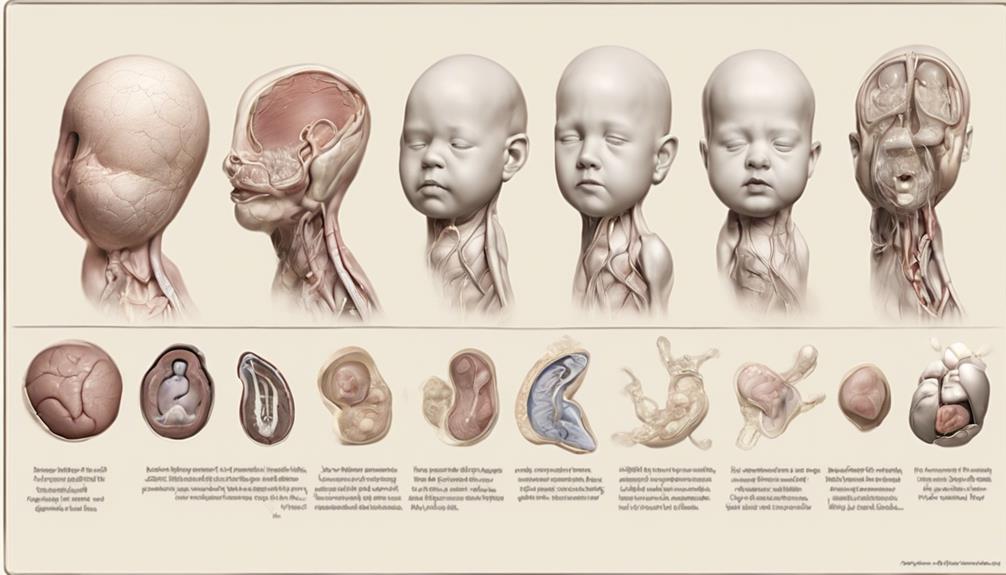So, you’re smoothly sailing into your second trimester when, out of nowhere, dealing with diarrhea turns into an unwelcome aspect of the experience.
Let’s talk about five practical tips that can help navigate this bumpy road with grace.
From dietary adjustments to lifestyle tweaks, we’ve got your back.
Stay tuned for some insightful strategies to ease discomfort and guarantee a smoother ride ahead.
Key Takeaways
- Follow a BRAT diet and include probiotic-rich foods for diarrhea management.
- Stay hydrated with water and electrolyte-rich fluids like coconut water.
- Incorporate natural remedies like herbal teas and soluble fiber sources to ease symptoms.
- Seek medical advice if diarrhea persists for more than 2 days or if signs of dehydration occur.
Dietary Adjustments for Managing Diarrhea
When managing diarrhea in the second trimester, making dietary adjustments is essential for alleviating symptoms and promoting gut health. Incorporating a BRAT diet, consisting of bananas, rice, applesauce, and toast, can provide essential nutrients while helping to reduce diarrhea symptoms.

Additionally, including probiotic-rich foods like yogurt and kefir in our meals can support gut health and minimize episodes of diarrhea. To ease digestion and manage diarrhea, it’s advisable to avoid high-fiber foods such as beans, whole grains, and raw vegetables. Opting for easily digestible foods like boiled potatoes, steamed vegetables, and lean proteins can further aid in gastrointestinal comfort during this period.
Furthermore, limiting our caffeine intake from coffee, tea, and soda is important in preventing additional irritation to the digestive system and reducing the frequency of diarrhea. By embracing these dietary adjustments, we can effectively address diarrhea issues in the second trimester while ensuring our bodies receive the necessary nutrients for a healthy pregnancy.
Hydration Tips During Pregnancy

Ensuring proper hydration is essential during pregnancy to support the increased blood volume and amniotic fluid production. Dehydration can pose risks like preterm labor, underscoring the importance of staying well-hydrated.
Pregnant individuals should aim to drink a minimum of 8-10 glasses of water daily to prevent dehydration and its potential complications. Apart from water, incorporating electrolyte-rich fluids such as coconut water or sports drinks can help maintain the best hydration levels.
Adequate hydration not only supports overall health during pregnancy but can also alleviate common discomforts like constipation and swelling. By prioritizing hydration, expecting individuals can help mitigate digestive issues, support amniotic fluid production, and reduce the likelihood of preterm labor.
Natural Remedies to Ease Symptoms
Staying well-hydrated during pregnancy is essential for maintaining overall health and preventing complications.
Now let’s explore natural remedies that can help ease symptoms like diarrhea during the second trimester. Consuming probiotic-rich foods such as yogurt and kefir can aid in restoring gut balance and alleviate diarrhea symptoms.
Herbal teas like ginger or peppermint are known for soothing the digestive system and reducing cramping that may occur during the second trimester.
Adding soluble fiber sources like oats or flaxseeds to your diet can help regulate bowel movements and bulk up stools, providing relief from diarrhea discomfort.
It’s important to avoid trigger foods like spicy dishes, caffeine, and high-fat foods that can worsen diarrhea symptoms. Additionally, practicing relaxation techniques such as deep breathing or gentle yoga can help reduce stress and anxiety, potentially contributing to fewer diarrhea episodes in the second trimester.
These natural remedies offer safe and effective ways to manage diarrhea and promote overall well-being during this stage of pregnancy.
Lifestyle Changes for Relief

To alleviate discomfort from diarrhea in the second trimester, it’s important to adjust our daily habits for relief. Stay hydrated by drinking plenty of water to combat dehydration caused by diarrhea. Additionally, consuming electrolyte-rich fluids such as sports drinks or broths can help replenish essential minerals lost during this time.
It’s advisable to steer clear of dairy products, high-fat foods, and sugary items as they can aggravate diarrhea symptoms. Resting and prioritizing relaxation are essential in aiding your body’s recovery process and managing the discomfort associated with diarrhea during the second trimester.
Remember to consult your healthcare provider for personalized guidance on how to best manage diarrhea in this stage of pregnancy, especially if the symptoms persist or worsen. Making these lifestyle changes can greatly improve your well-being and alleviate the challenges posed by diarrhea in the second trimester.
When to Seek Medical Advice
When experiencing persistent diarrhea beyond 2 days in the second trimester of pregnancy, it’s essential to promptly contact your healthcare provider for guidance and support. Prolonged diarrhea during this stage can lead to dehydration, which poses risks to both you and your baby.
If you notice blood in your stool or have a fever above 100.4°F while managing diarrhea, seeking medical advice is important. Signs of dehydration, such as dark yellow urine, decreased urine output, or a dry mouth, also warrant immediate medical attention.
It’s important to remember that prolonged diarrhea impacting your overall well-being or pregnancy should prompt you to seek help from a healthcare professional. Staying hydrated is key in managing diarrhea, but if symptoms persist or worsen, reaching out to your doctor ensures the best care for you and your baby.
Your healthcare provider is there to support you through any challenges you may face during this delicate time.
Frequently Asked Questions
What Helps Diarrhea in Second Trimester of Pregnancy?
To manage diarrhea in the second trimester of pregnancy, we focus on staying hydrated, consuming electrolyte-rich fluids, following a bland diet, incorporating probiotics, and seeking healthcare provider guidance for safe medication options.
Is Diarrhea Bad at 5 Weeks Pregnant?
When dealing with diarrhea at 5 weeks pregnant, it is crucial to monitor symptoms closely and seek medical advice if needed. Hydration, rest, and dietary adjustments can help manage it, ensuring both maternal and fetal well-being.
What Stops Diarrhea Fast Naturally?
When diarrhea strikes, we rely on simple remedies like bananas, rice, applesauce, and herbal teas for quick relief. Staying hydrated and getting rest are key. Probiotics can also help restore gut health and ease symptoms naturally.
How Does Diarrhea Affect Fetus?
Diarrhea in pregnancy can impact the fetus by causing dehydration, affecting nutrient supply, and potentially triggering preterm labor. It’s essential to manage diarrhea promptly to safeguard both maternal and fetal health.
Conclusion
To sum up, managing diarrhea in the second trimester of pregnancy can be challenging, but with the right tips and strategies, it’s possible to alleviate symptoms and promote overall well-being for both you and your baby.
Remember, ‘An ounce of prevention is worth a pound of cure.’ By making simple dietary adjustments, staying hydrated, and seeking medical advice when needed, you can effectively manage diarrhea during this stage of pregnancy.
Stay healthy and take care of yourself!










